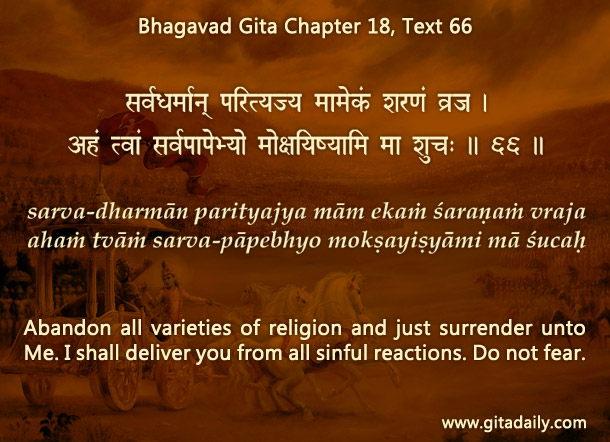The Bhagavad-gita’s concluding call (18.66: Give up all dharma) often perplexes people. They ask, “Why does the Gita, a book on dharma, ask us to give up dharma? Doesn’t this contradict its earlier statement (04.08) that Krishna descends to establish dharma?”
To understand this verse, we need to look at the word dharma and at the Gita’s context. While dharma has many meanings, the meaning germane to this verse is religious duty or, simply, duty.
Consider the Gita’s context. Did Arjuna, the Gita’s original student give up all duties and become irresponsible? No. Far from it, he gallantly did his duty as a martial guardian of society.
What Arjuna did give up was his dynastic duty, which had been holding him back from fighting against his relatives. Throughout his life, Arjuna had done that dynastic duty, being respectful to his elders and accommodating to his equals. But when those relatives acted viciously, his martial duty demanded that he curb them. Torn between his dynastic and martial duties, he found himself in an ethical bind. The Gita’s concluding call showed him the way out of that bind. How? By stressing his most fundamental duty – devotional service to God – and rejecting those material duties that obstructed such service. Accordingly, to help Krishna in the mission of establishing social order, Arjuna adopted his martial duty and rejected his dynastic duty. By studying the Gita’s context, we understand the thrust of its concluding call – not the rejection of duty per se, but the rejection of that duty which impedes the highest duty.
When we are pulled in different directions by our different roles such as family members, professionals and citizens, we can focus on the unifying principle of service to Krishna. And eventually that prayerful service attitude will show us the way ahead.
To know more about this verse, please click on the image
Explanation of article:
Podcast:


Right on. Love it. Thank you! Very timely message for me today. Thank you.
devotion to KRISHNA is the basis of all DHARMA